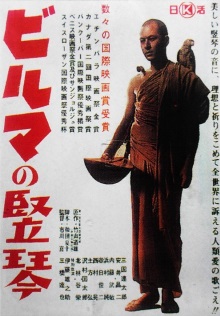
This one was a pick by my wife who had heard about it as a notable film about Buddhism long ago but had never seen it. It is apparently quite highly regarded, being a nominee for the Academy Award for Best Foreign Language Film during the first year that the category existed. Note that I’m going to be more spoilery than usual partly because this is such an old film but mostly because it’s hard to say anything worth saying about it without revealing much of the plot.
Set during the waning days of the Second World War in Burma, the film tells the story of an isolated unit of Japanese soldiers. Led by a musically-inclined captain, they sing songs to lift their spirits as they attempt to retreat to Thailand. One of them, Mizushima, becomes proficient at playing the Burmese harp, or saung, and provides instrumental accompaniment for the songs.
But after they learn that Japan has surrendered, they lay down their arms peacefully. Mizushima is separated from his comrades-in-arms when he is sent by the Allies to convince another Japanese unit to give up. It is while he is on this solo mission that he is forced to confront the full human cost of the war and turns to Buddhism.
I’m pleased to note that the film isn’t overbearing at all in its depiction of religion. It is interesting that by and large Mizushima’s comrades don’t share his sense of horror about the war dead. Instead they miss him and they miss Japan. It illustrates that the compassion that Mizushima feels for the unburied dead is clearly a personal burden. At the same time, the longing of the other soldiers for home and their wish that Mizushima would rejoin them adds an additional layer of depth.
One of the most surprising things about The Burmese Harp is how unabashedly pacifistic it is. This is a film about Buddhist values, so of course it needs to be pacifist, but given the jingoism and nationalism that is the order of the day now, this still felt like a shock to me. A great example of this is when the other Japanese unit absolutely refuses to surrender, citing the usual platitudes about honourably dying in service of the emperor, and is then slaughtered to the last man, leaving Mizushima the sole survivor. That’s a refreshingly bald statement about how dying in battle is pointless and serves no one.
Director Kon Ichikawa does a fantastic job of selling the depth of the tragedy without falling into a melodrama. This is greatly helped by the sparseness of the dialogue and the use of music to set the appropriate mood, even if as my wife notes, the singing is obviously dubbed in. There are even well-done moments of levity to round out the film, exemplified in the character of the old Burmese woman who comes to trade with the soldiers.
Overall this is a film that surprised me with its level of quality and the depth of its Buddhist convictions. Highly recommended.